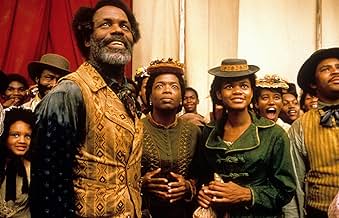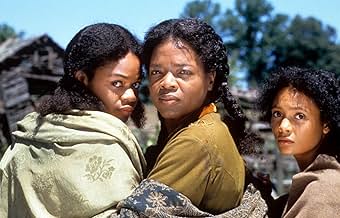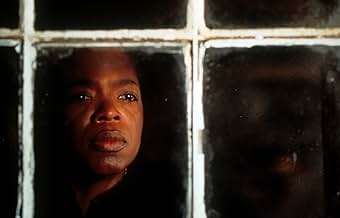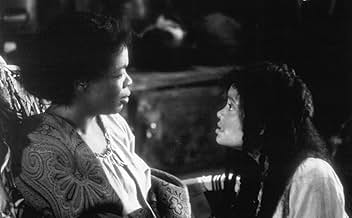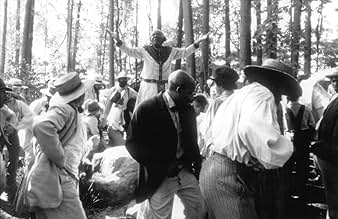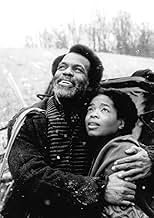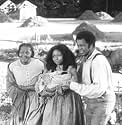CALIFICACIÓN DE IMDb
6.0/10
9.7 k
TU CALIFICACIÓN
Basada en el libro de Toni Morrison, en el que una esclava es visitada por el misterioso espíritu de una joven.Basada en el libro de Toni Morrison, en el que una esclava es visitada por el misterioso espíritu de una joven.Basada en el libro de Toni Morrison, en el que una esclava es visitada por el misterioso espíritu de una joven.
- Nominado a 1 premio Óscar
- 3 premios ganados y 24 nominaciones en total
Kessia Embry
- Amy Denver
- (as Kessia Kordelle)
LisaGay Hamilton
- Younger Sethe
- (as Lisa Gay Hamilton)
Thandiwe Newton
- Beloved
- (as Thandie Newton)
Argumento
¿Sabías que…?
- TriviaThandiwe Newton's African first name means, interestingly enough, "beloved."
- ErroresIn the scene with a deer in the field, a car is visible driving by in the upper right hand corner.
- Citas
Baby Suggs: And the beat, beat, of your heart... Love it. More than the lungs that need yet to breathe free air. More than the womb, which holds life. More than the private parts that give life. Love your heart. This... this is the prize. Amen. This the prize... Amen!
- Créditos curiososIn lieu of traditional opening credits, the movie begins with the camera moving through a cemetery to focus on a gravestone engraved with the sole word "BELOVED".
- Versiones alternativasIn the version aired on television there is a deleted scene and two alternate scenes. The TV version also removes any mention of Sethe's sons. They don't exist in the TV version. The first alternate scene is when Paul D is telling Sethe about Halle being in the loft. In the theatrical you see Paul D quoting Halle. In the TV version there is a flashback to Halle (Hill Harper) saying "The loft." The second alternate scene in the prayer group discussing how to deal with Sethe being haunted by Beloved. In the theatrical there is a line about Sethe being like batter. In the Tv version that is removed and there is a line inserted from another woman saying "I don't mind a little communication between worlds but this is invasion" and another character says "we better get to work and pray" The deleted scene added for the TV version has Stamp Paid asking Paul D if beloved is his problem and not what Sethe did.
Opinión destacada
I read Beloved in an intro English course and it took me a long while to get used to Toni Morrison's writing style. She once said in an interview that she wrote the book to be disorienting, in some ways to re-enact the feeling of the slave diaspora.
I thought the book heart-wrenching, at times gut-wrenching, and vivid. The character of Paul D never made much sense, seeming like a man waiting for something to happen, but Sethe burned off the page. What I remember most is Baby Suggs' speech at the rock, which the film has divided into three segments.
I projected Beloved for the college theater and I have to say it was long and arduous, especially if you haven't read the novel. There is no SENSE to the PAIN that goes on with these characters; in Braveheart and Titanic, we have a certain tragic pleasure in mass death or torture that we can't receive from Beloved. I read a lot of comments talking about the ghost in Beloved, but the ghost is more of a catalyst for looking into the characters than the star of the film.
I admired the time put in most. It just seemed like Demme and Tak Fujimoto, and the lighting designer as well, gave the actors the time they needed to act and sink into things: unlike traditional MTV-editing, some scenes were comprised of only one shot, usually tracking, as Paul D and Sethe in the cornfield. The score was brilliant; Portman really found a grace in stillness and the trembling African voice and the flute. It was bare but riveting at the same time.
People have said that the film went for too much shock value. That's possible- did we need the close-up of the dead child at the breast? No. But then again when we read it in the book, don't we think of it? Don't we for a split second see that image in our heads? I for one thought of much more graphic things when Morrison discussed Paul D and Beloved's night in the shed. The camera and the actors treat the world of Beloved and the audience with respect. Winfrey does seem more like someone who loves Sethe's character, than Sethe herself, but she did it for me. The sadness, the strength, emptiness, she did it, and Lisa Gay Hamilton as the young Sethe was riveting with her time in the film. The look in her eyes when Schoolteacher says "Animal" is amazing.
Danny Glover always does a good job, but he didn't really amaze me. For me, you know what you're getting with Glover, nice guy, troubled soul, easy-going with fits of rage every now and then. It's what he likes to play, and he does it well here but no surprises. The surprises are Winfrey, and Kimberly Elise especially in those crucial minutes when she decides to leave home, the fear and determination on her face. (She somehow becomes more sexual by the end of the film when she sees Paul D.) Thandie Newton is incredibly freaky and disgusting as Beloved with the exception of that ONE long gaze she gives Danny Glover that night, seduction, perfect symmetry. And Beah Richards as Baby Suggs: I wanted her to be my mother. She broke my heart with her religion: "This is the prize. This is the prize." The preaching scenes are INCREDIBLE in this film, especially since Tak Fujimoto chooses a circular tracking shot that allows them to do it all at once.
There isn't much redemption at the end. Sethe is drained and miserable. Paul D is on his own but still not totally free. I think Roger Ebert's comment put it best: the happy ending of Beloved is that the ordeal is OVER. There is no sense to the pain, but one hopes at the end that there can be healing.
I loved this film. I loved the fact that it's not hammering any one message home, but you can take things about motherhood, race, brutality, the dangers of love and commitment, freedom, and chains out with you: it's all there. And it is as beautiful as it is wrenching.
I thought the book heart-wrenching, at times gut-wrenching, and vivid. The character of Paul D never made much sense, seeming like a man waiting for something to happen, but Sethe burned off the page. What I remember most is Baby Suggs' speech at the rock, which the film has divided into three segments.
I projected Beloved for the college theater and I have to say it was long and arduous, especially if you haven't read the novel. There is no SENSE to the PAIN that goes on with these characters; in Braveheart and Titanic, we have a certain tragic pleasure in mass death or torture that we can't receive from Beloved. I read a lot of comments talking about the ghost in Beloved, but the ghost is more of a catalyst for looking into the characters than the star of the film.
I admired the time put in most. It just seemed like Demme and Tak Fujimoto, and the lighting designer as well, gave the actors the time they needed to act and sink into things: unlike traditional MTV-editing, some scenes were comprised of only one shot, usually tracking, as Paul D and Sethe in the cornfield. The score was brilliant; Portman really found a grace in stillness and the trembling African voice and the flute. It was bare but riveting at the same time.
People have said that the film went for too much shock value. That's possible- did we need the close-up of the dead child at the breast? No. But then again when we read it in the book, don't we think of it? Don't we for a split second see that image in our heads? I for one thought of much more graphic things when Morrison discussed Paul D and Beloved's night in the shed. The camera and the actors treat the world of Beloved and the audience with respect. Winfrey does seem more like someone who loves Sethe's character, than Sethe herself, but she did it for me. The sadness, the strength, emptiness, she did it, and Lisa Gay Hamilton as the young Sethe was riveting with her time in the film. The look in her eyes when Schoolteacher says "Animal" is amazing.
Danny Glover always does a good job, but he didn't really amaze me. For me, you know what you're getting with Glover, nice guy, troubled soul, easy-going with fits of rage every now and then. It's what he likes to play, and he does it well here but no surprises. The surprises are Winfrey, and Kimberly Elise especially in those crucial minutes when she decides to leave home, the fear and determination on her face. (She somehow becomes more sexual by the end of the film when she sees Paul D.) Thandie Newton is incredibly freaky and disgusting as Beloved with the exception of that ONE long gaze she gives Danny Glover that night, seduction, perfect symmetry. And Beah Richards as Baby Suggs: I wanted her to be my mother. She broke my heart with her religion: "This is the prize. This is the prize." The preaching scenes are INCREDIBLE in this film, especially since Tak Fujimoto chooses a circular tracking shot that allows them to do it all at once.
There isn't much redemption at the end. Sethe is drained and miserable. Paul D is on his own but still not totally free. I think Roger Ebert's comment put it best: the happy ending of Beloved is that the ordeal is OVER. There is no sense to the pain, but one hopes at the end that there can be healing.
I loved this film. I loved the fact that it's not hammering any one message home, but you can take things about motherhood, race, brutality, the dangers of love and commitment, freedom, and chains out with you: it's all there. And it is as beautiful as it is wrenching.
- DannyBoy-17
- 19 mar 1999
- Enlace permanente
Selecciones populares
Inicia sesión para calificar y agrega a la lista de videos para obtener recomendaciones personalizadas
Detalles
Taquilla
- Presupuesto
- USD 80,000,000 (estimado)
- Total en EE. UU. y Canadá
- USD 22,852,487
- Fin de semana de estreno en EE. UU. y Canadá
- USD 8,165,551
- 18 oct 1998
- Total a nivel mundial
- USD 22,852,487
- Tiempo de ejecución2 horas 52 minutos
- Color
- Mezcla de sonido
- Relación de aspecto
- 1.85 : 1
Contribuir a esta página
Sugiere una edición o agrega el contenido que falta



